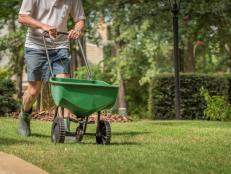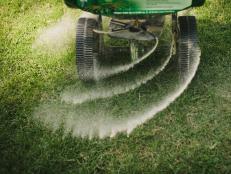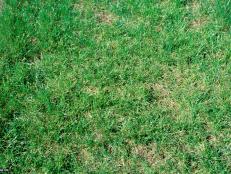Bermuda Grass vs. St. Augustine Grass
If you live in a warm climate, you’ve got two great options for a lush lawn. Bermuda and St. Augustine grasses are both thick and great at choking out weeds. But which should you choose? We’ll demystify some common questions about the two so you can get the most from your lawn.

Shutterstock/tammykayphoto
Bermuda grass

The first step in choosing any species of turfgrass is knowing what USDA zone you live in. You can determine that by visiting the USDA hardiness zone map and putting in your ZIP code. Bermuda grass does well in zones 7, 8, 9 and 10, while St. Augustine grass really only performs well in zones 8 through 10. So, if you live along the Gulf Coast or warm coastal areas of the country, St. Augustine grass is a better choice. If you’re living in parts of Tennessee, North Carolina, Central California, Oklahoma or Arkansas, Bermuda grass is a better choice for you since it’s more tolerant of the occasional cold snap.
These Lawns Get Thirsty
Both St. Augustine and Bermuda grasses require a substantial watering regimen, but between the two St. Augustine needs almost twice as much as the competition. So, it’s worth factoring into your decision if you live in an area that has water conservation policies or frequently experiences droughts. Bermuda grass, on the other hand, requires very little water during its dormant season and can be drought tolerant when properly cared for.
Sun and Shade Requirements
St. Augustine grass is tough stuff when it’s growing in a climate that’s suitable for it and is highly tolerant of the shaded areas around your home. Bermuda grass, on the other hand, is really only suitable for full sun applications. While it absolutely thrives in full sun, it will not grow vigorously in shady areas.

Shutterstock/tammykayphoto
St. Augustine grass
Establishing a New Lawn
When it comes to laying a brand-new lawn, the choice between the two grasses comes down to preference and speed. Bermuda grass can easily be laid by seeding an area. If you’re in no rush to have a lawn and enjoy watching the grass grow in, this will be substantially cheaper than sod. St. Augustine grass cannot reliably be started from seed so laying sod or plugs is your best option, but the gratification is immediate. Overall, St. Augustine grass is going to require more regular maintenance when it comes to mowing and trimming. One of St. Augustine’s major flaws is that it tends to develop thatch rapidly compared to other grasses. While most lawns only need to be de-thatched in extreme cases, St. Augustine will need it almost yearly in some areas. Bermuda grass is slightly less maintenance, but don’t be fooled. The more frequently you mow, the thicker it’s going to grow, and it can get out of hand quickly if neglected.
Soil Conditions
St. Augustine grass requires three to six pounds of nitrogen per 1,000 square feet of lawn annually, while Bermuda grass only needs about one to four pounds for the same area. Bermuda grass will more likely require a frequent top dressing of compost than St. Augustine will and generally requires a much richer soil condition. St. Augustine grass is very resilient to salty conditions and sandy soils, making it ideal for houses in coastal areas where the topsoil conditions tend to be poor.












































